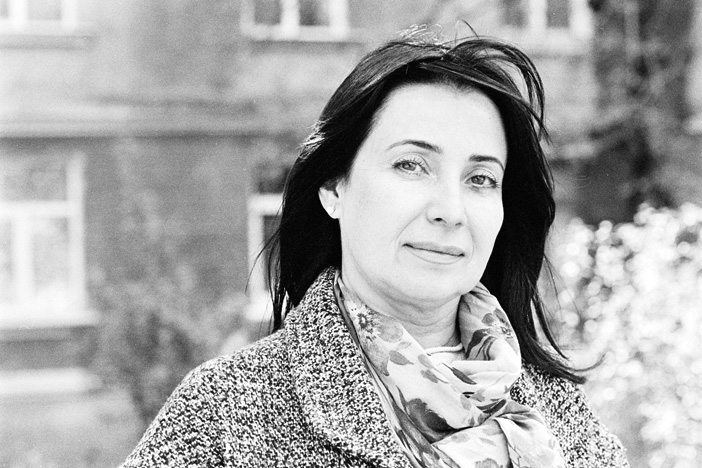
Natascha, psychologist at the Promir centre that provides help for adults and children with war traumata, (please look also here and here)
»Now, we are living in a situation where the need for psychological help is not acute but chronic.<< >>
People should absolutely know whom they can get in contact with and they should at least know some simple methods to help themselves. We have approached the regional administration with this issue, too, but until now such offers for the people in cooperation with international organizations exist only directly along the front-line.
The first result of a trauma is always a collapse of safety which causes post-traumatic stress (PTSD)*. We are in the fourth year of the war where everything is uncertain and nothing is confident, so it takes a long time to get rid of these symptoms of trauma.
It is enough even for a normal person while watching TV or talking to someone on the street about certain things that this triggers his trauma. Hence all the information that influences people, does not raise their confidence in the future: maybe there will be another attack of the opposing side or military action on our side. These feelings of insecurity have accumulated during the years of the war.
People react very differently to a trauma concerning their senses.
Some people have a strong sense of visual perception and seeing one image is enough to trigger a flashback. For other people it is sounds. They may have experienced explosions, and just one sound provokes the memory of the explosion. The sense of smell also has a very strong effect, for example the smell of gunpowder or the smell of cellars. Many people on the front-line, who have spent a long time in cellars, report that the smell of cellars causes panic attacks. The trauma is internalized in the memory of the body and it only takes a small stimulus to trigger it again.
We try to find out what kind of flashback has formed during the therapy. When we found out, we need a lot of time to work with these trauma patients. The post-traumatic stress (PTSD) forms a trauma vortex* among the affected people and this accompanies those persons throughout their lives.
The slightest memory of his trauma pulls the patient back into this vortex. We are working exactly with this trauma vortex. Our therapy is like a kind of shuttle movement, where we go back and forth between the event of the past and today. We ask what happened in the past, what did you feel then and how are you feeling now? We go into the past and into the present, always in alternation as if we were knitting, that means we try to connect both experiences.
There are only three possible instinctive reactions for terrifying events: total freezing, running away or starting to fight. This only happens on an instinctive level. We try to enable the patient to stay in the present without being pulled back into the past. Usually, those people state that they do not want to think about the trauma because it is painful and scaring and because panic attacks that can follow waste a lot of energy. But this affects their lives and the persons could fall into a depression or, on the contrary, become very impulsive and aggressive.
Trauma causes very strong emotional reactions. We sometimes suggest that patients should imagine the triggering event on a screen (screening method) and not in themselves. That helps them to abstract and to put themselves into a meta position. Another method is desensitization. In this method we try to balance both brain halves. We trigger emotional reactions and teach people breathing techniques at the same time that help them to cope with their own reactions.
Children from the front-line can hear the direction of shelling very well, they are very competent in the classification of noises. If a stranger came to the front-line, he would be immediately in a panic. But the children there are absolutely calm as they have adapted to the situation. However, if we take them out of the front area, the children become frightened of other sounds, for example the bang of a door or pure silence. They feel it is too quiet in the non-combat zone. They got used to the shootings and need time to adjust to the new situation.
When we are working with children, it depends on their age whether we are working on an emotional or a rational level. In case of very young children it is impossible to talk to them about the incidents. You can only play with them. One should support the child in this play process to enable it to express his trauma. In this context the art therapy is very helpful. Young children don't have a developed vocabulary and concept of meaning. The child can say I'm scared or I want to cry, but a conversation similar to one with adults does not work at all. Useful methods are games, interactions, painting, dancing, music and all these things together. On the other hand one can rather talk with teenagers about the events and ask their opinions and impressions.
Many small children who live next to the front-line have language problems and for me that's not surprising. For example, if the child was three years old at the beginning of the war, it now is in a post-stress situation as a result of the ongoing war and does not want to develop further. It prefers to stay small and does not want to develop. These children stop their emotional and verbal development, because the adults and their parents are affected by the situation, too, and are not able to support their children in a proper way. There is a lack of specialists in the front-line zone, such as logopedics, who should work regularly with the children.
When we talk to children with a trauma, first we make sure that the child is really willing to talk about the trauma. We approach the children with very small steps letting them decide when they want to express their feelings or talk about them. At first, the child does not understand why it is crying. Only if for example the mother reacts to the child's feelings correctly, the child is able to learn what happend to him. Unfortunately, not all parents are able to respond appropriately to the feelings of their children e.g. because they are too tired or worked too hard.
In such situations we - as psychologists - adopt the role of the mother and try to explain their own feelings to the children. When they understand what is happening inside their psyche they also discover their needs and what might help them. If a child is afraid, it needs security or a person who embodies that security. Then the child can ask for help.
First, we always build a safe environment and confidence to let the psychologist turn into the personified support for the child. Only by building this confidence and acceptance and the offering of help the child will understand that it no longer has to be afraid. Very slowly the child will remember certain moments. We never push the children. On the contrary: we always adapt our work to the speed of the child to enable it to handle the information. We are not allowed to speak directly about the traumatizing event or to force the child into that direction.
Especially behavioral therapy is effective in our work. All our options in this form of therapy lead to fast stabilization. And then you can dive a little deeper into things with Gestalt therapy. Only 12 sessions in CBT (Cognitive Behavioral Therapy) really lead to a result.In 2014 our difficulty was to systematically utilize this therapy e.g. with PTSD patients. After meeting many colleagues who have worked in Chechnya and Bosnia, we benefitted from their practical experiences and now we know how to work with it.
The problem in the occupied territories is that young and experienced psychologists have left the area and only older psychologists are left who already retired and did not find another place to go. There are very few young psychologists in the occupied territories and many of them are burned out hence they are in a PTSD situation themselves.
So far, relief efforts have been funded by international organizations such as UNICEF or OSCE, but now these organizations are ending their support and require that state authorities continue the funding. I can really understand this approach by UNICEF trying to make the government take over this task from now on. UNICEF has provided help only at the beginning and now we have to take the responsibility of ourselves.
I also worked with soldiers and that was very difficult.
They do not consider us psychologists as equal and do not accept us because we did not actively participate in the war. They do not think we could understand their problems because we have never been right at the front-line. They have no confidence in a long-lasting therapy and they only hope to solve psychological problems as quickly as possible. My idea would be to train former soldiers as psychologists. They only want some advice from me, but if I want to delve deeper into their problems, they just reply that I would not understand them.
However, personally, I have a lot of interest in these cases and I have spoken to many soldiers of the combat area.
When a soldier comes back into his family from the combat area, it totally changes the family life. The brains of soldiers who have been at the front for a long time are totally transformed. During the fighting, the amygdala* in the brain of soldiers is overstimulated and when they return, the overstimulation is still there.
And even the smallest trigger in daily life produces violent and huge reactions. If a soldier returns to his family, you have to work with the whole family, and in my opinion the therapy of the whole family should already begin before the soldier leaves his family for the fighting. Experts could explain to him what will happen to him, which new emotional reactions might occur and how his behavior can be changed. With this method the family would understand that the person who left them will be a little different after his return. Not because he is a bad person, but because his functions have changed while fighting.
After returning from their mission veterans become very bossy. They had a close fellowship with their comrades, they have been only among themselves. This community might be useful during the war, but after returning into normal life everything seems to be different, unimportant, petty and meaningless. The war veterans have developed a completely different sense of life. There should be a government program which should be responsible for these aspects of the post war life of soldiers, families and their children for whom the situation is also difficult because their fathers act abnormally because they are still in a state of war mentally.
The aggression and the readiness for conflict of these fathers will increase strongly.«
* PTSD = posttraumatic stress disorder
* Trauma vortex is a metaphor that describes the turmoil of chaos in trauma's aftermath
* Amygdala is a part of the limbic system that is active during excitement
